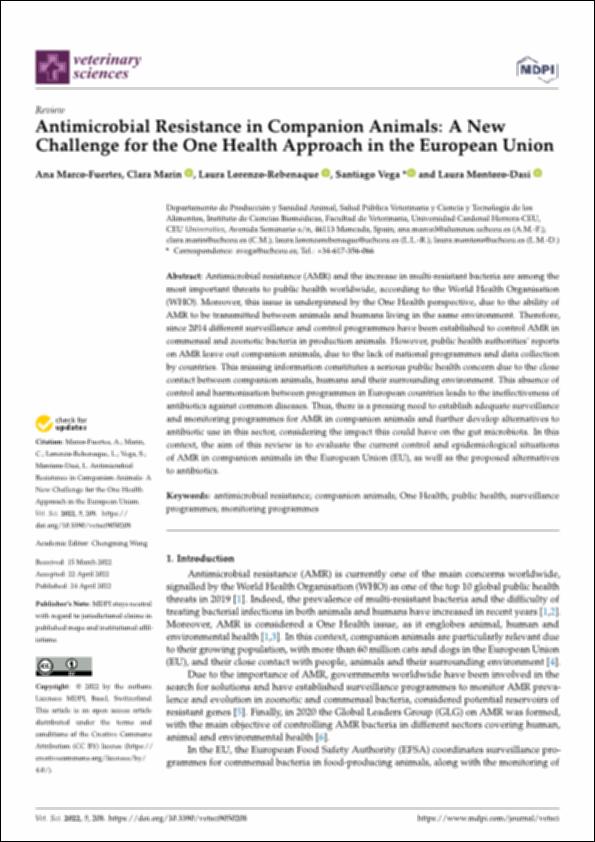Please use this identifier to cite or link to this item:
http://hdl.handle.net/10637/13983Antimicrobial resistance in companion animals : a new challenge for the one health approach in the European Union
| Title: | Antimicrobial resistance in companion animals : a new challenge for the one health approach in the European Union |
| Authors : | Marco Fuertes, Ana Marín Orenga, Clara Lorenzo Rebenaque, Laura Vega García, Santiago Montoro Dasí, Laura |
| Keywords: | Drug resistance in bacteria.; Veterinary epidemiology.; Animales de compañía.; Bacterias - Resistencia a los medicamentos.; Pets.; Salud pública.; Public health.; Epizootiología. |
| Publisher: | MDPI |
| Citation: | Marco-Fuertes, A., Marin, C., Lorenzo-Rebenaque, L., Vega, S. & Montoro-Dasi, L. (2022). Antimicrobial resistance in companion animals: a new challenge for the one health approach in the European Union. Veterinary Sciences, vol. 9, i. 5 (24 apr.), art. 208. DOI: http://dx.doi.org/10.3390/vetsci9050208 |
| Abstract: | Antimicrobial resistance (AMR) and the increase in multi-resistant bacteria are among the most important threats to public health worldwide, according to the World Health Organisation (WHO). Moreover, this issue is underpinned by the One Health perspective, due to the ability of AMR to be transmitted between animals and humans living in the same environment. Therefore, since 2014 different surveillance and control programmes have been established to control AMR in commensal and zoonotic bacteria in production animals. However, public health authorities’ reports on AMR leave out companion animals, due to the lack of national programmes and data collection by countries. This missing information constitutes a serious public health concern due to the close contact between companion animals, humans and their surrounding environment. This absence of control and harmonisation between programmes in European countries leads to the ineffectiveness of antibiotics against common diseases. Thus, there is a pressing need to establish adequate surveillance and monitoring programmes for AMR in companion animals and further develop alternatives to antibiotic use in this sector, considering the impact this could have on the gut microbiota. In this context, the aim of this review is to evaluate the current control and epidemiological situations of AMR in companion animals in the European Union (EU), as well as the proposed alternatives to antibiotics. |
| Description: | En Veterinary Sciences. Basilea (Suiza) : MDPI. Vol. 9, n. 5 (24 apr. 2022), art. 208. e-ISSN 2306-7381. Este artículo se encuentra disponible en la siguiente URL: https://www.mdpi.com/2306-7381/9/5/208 Este artículo pertenece al número especial "Antimicrobial Resistance in Animals: Economic Impact and Public Health Significance". |
| URI: | http://hdl.handle.net/10637/13983 |
| Rights : | http://creativecommons.org/licenses/by/4.0/deed.es |
| ISSN: | 2306-7381 (Electrónico) |
| Issue Date: | 24-Apr-2022 |
| Center : | Universidad Cardenal Herrera-CEU |
| Appears in Collections: | Dpto. Producción y Sanidad Animal, Salud Pública Veterinaria y Ciencia y Tecnología de los Alimentos |
Items in DSpace are protected by copyright, with all rights reserved, unless otherwise indicated.


